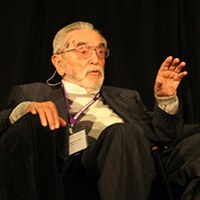EP95 Workshop 34 - Supervision in Family Therapy - Salvador Minuchin, MD
- Average Rating:
- Not yet rated
- Topic Areas:
- Workshops | Family Therapy | Supervision | Therapist Development | Psychotherapy
- Categories:
- Evolution of Psychotherapy | Evolution of Psychotherapy 1995 | Pioneers in Couples and Family Therapy
- Faculty:
- Salvador Minuchin, MD
- Duration:
- 1 Hour 29 Minutes
- Format:
- Audio Only
- Original Program Date:
- Dec 17, 1995
- License:
- Never Expires.
Description
Description: This workshop invites therapists to stretch beyond habitual ways of working by blending creativity, experiential supervision, and family therapy principles. Therapists share stories from clinical practice—including a case involving a family raising a child with Down syndrome—and explore with Minuchin how expanding perspective can deepen therapeutic impact. The session closes with reflections on the role of elders and the need for a more engaged, socially responsive field.
This workshop is a consideration of the need and methods to expand a therapist's available range.
Educational Objectives:
- To describe the foundations that every therapist has, and the idiosyncratic styles that constrain their interventions.
- To describe a form of supervision that, accepting the therapist's baselines, moves toward an expansion on the repertory of therapeutic possibilities.
- To describe the process of the relationship between supervisor and supervisee.
*Sessions may be edited for content and to preserve confidentiality*
Credits
Handouts
| Timestamped Transcript (1 MB) | 26 Pages | Available after Purchase |
Faculty

Salvador Minuchin, MD Related Seminars and Products
Salvador Minuchin, MD, developed Structural Family Therapy, which addresses problems within a family by charting the relationships between family members, or between subsets of family. He was Director of the Philadelphia Child Guidance Clinic. Although it was minimally staffed when he began, under his tutelage the Clinic grew to become one of the most modeled and respected child guidance facilities in the world. In 1981, Minuchin began his own family therapy center in New York. After his retirement in 1996, the center was renamed the Minuchin Center. Dr. Minuchin is the author of many notable books, including many classics. His latest is Mastering Family Therapy: Journeys of Growth and Transformation. In 2007, a survey of 2,600 practitioners named Minuchin as one of the ten most influential therapists of the past quarter-century.


